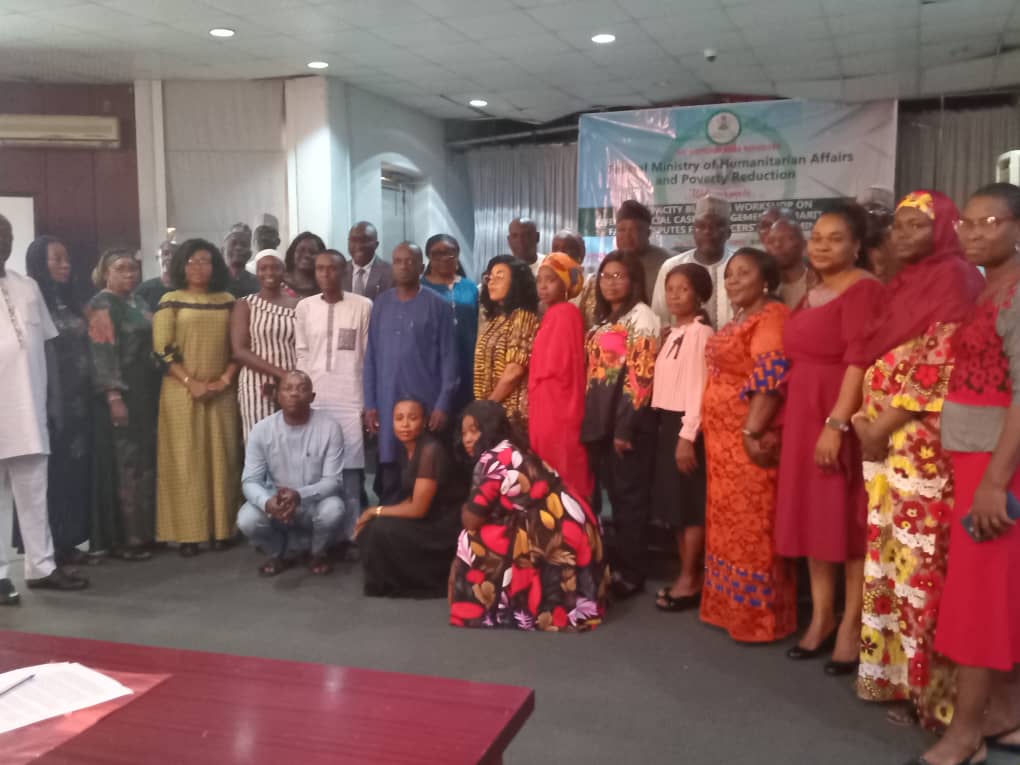The Federal Ministry of Humanitarian Affairs and Poverty Alleviation has trained her staff with social case management skills. Aimed at enhancing the capacity of staff to effectively manage social cases in marital and family disputes.
At a capacity building workshop on effective social case management in marital and family disputes for officers of the Ministry held on Wednesday in Abuja.
The Permanent Secretary of the Ministry, Yakubu Adam Kofarmata who was represented by Meshak Onyinloye, Director planning, research, and statistics keynote address noted the workshop aims to create a cadre of skilled practitioners capable of addressing the unique challenges faced by Nigerian families.
The event which was organised by the Department of Social Development of the Federal Ministry of Humanitarian Affairs and Poverty Reduction, reflects the Ministry’s unwavering commitment to addressing the critical challenges facing families and communities in our society today.
The Permanent Secretary identified family, as the bedrock of society that plays pivotal role in shaping values, behaviours, and attitudes that define our collective future.
“When families thrive, communities flourish; and when communities flourish, the nation prospers. However, the realities of modern life have introduced complexities that place significant strain on marital and family relationships. Social conflicts, economic pressures, and cultural transitions are but a few of the challenges confronting families across Nigeria.”
He stressed the need for professional intervention mechanisms to address marital and family disputes cannot be overemphasized.
“It is imperative that we equip our social welfare professionals with the necessary tools, skills, and knowledge to mediate, resolve, and manage such disputes effectively, ensuring that the family unit remains a source of stability and strength.
However, Social case management is a structured approach that combines assessment, planning, coordination, and advocacy to address the specific needs of individuals and families. In the context of marital and family disputes, it serves as a critical framework for identifying underlying issues, fostering effective communication, and facilitating sustainable resolutions.
“This workshop is designed to empower participants with best practices and innovative approaches to professional social case management. By integrating global standards with local cultural nuances, we aim to create a cadre of skilled practitioners capable of addressing the unique challenges faced by Nigerian families.
” Our administration is committed to promoting social cohesion, reducing poverty, and fostering a sense of shared responsibility among citizens. Strengthening family structures through professional interventions is a vital component of this vision, as it directly contributes to the well-being and stability of our communities.”
Earlier in his welcome address, the director social development department of the Ministry, Valentine Ezulu noted the gathering underscores the Ministry’s dedication to addressing the pressing social challenges affecting families in our nation.
“Families serve as the cornerstone of our communities, shaping the values, attitudes, and aspirations of individuals who, in turn, contribute to the development of our society. When families face challenges, the ripple effects are felt throughout our communities, affecting social stability, productivity, and overall national cohesion.
He informed that marital and family disputes are increasingly becoming prevalent due to a myriad of social, economic, and cultural factors.
“This workshop is specifically designed to equip social welfare practitioners with the requisite skills and knowledge to effectively manage marital and family disputes. It focuses on practical strategies and evidence-based approaches that are culturally relevant to our society.
“By enhancing your capacity as social workers, mediators, and advocates, we aim to strengthen the support systems available to families in distress and foster harmonious relationships within our communities.”
He urged all participants to engage actively in the discussions, share insights and experiences, and embrace the tools and techniques that will be shared.
















